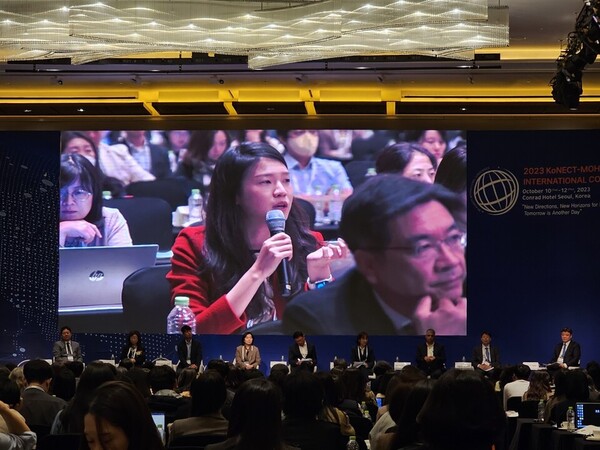
Korean and foreign pharma and biotech experts recently gathered to discuss strategies to reverse the current downturn in the industry.
The 2023 KoNECT International Conference (KIC) was held at the Conrad Hotel in Yeouido, Seoul, on Tuesday. Co-hosted by the Korea National Enterprise for Clinical Trials (KoNECT), the Ministry of Health and Welfare, and the Ministry of Food and Drug Safety, the KIC is now in its ninth year.
In the morning, a keynote speech by Koichi Miyazaki, Vice President of Clinical Development at Daiichi Sankyo, was followed by a talk show on “Challenges and Issues in Drug Development.”
UNIST Professor Baek Seung-jae and Dream CIS Executive Director Kang Seong-shik (a cardiothoracic surgeon) chaired the panel discussion. Among the panelists were Chang Myeong-ho, Clinical General Manager at GI Innovation, Hwang Man-soon, CEO of Korea Investment Partners, Lee Sung-gil, a partner of Kim & Chang law firm, Moon Han-rim, CEO of MediRama, Heo Hye-min, analyst at Kiwoom Securities, Kim Jae-eun, CEO of 1ST Biotherapeutics, and Ali Pashazadeh, Chairman of Treehill Partners.
The panelists diagnosed that the capital market’s investment in the bio-industry has decreased, and many domestic bio companies are experiencing business difficulties due to deteriorating funding.
"Fortunately, we could finalize the investment this summer. It would be more correct to say we have managed to survive,” said 1ST Biotherapeutics CEO Kim, who recently secured a Series C investment, while explaining the industry's situation. “Recently, the number of job-seekers knocking on our door has increased dramatically. Most of them did so due to deteriorating management at their previous employers."
Foreign biotech companies use exit strategy through mergers and acquisitions in addition to initial public offerings, but M&As are not actively made in Korea. GI Innovation CEO Chang provided the reasons, saying, "It is not easy for unlisted bio companies to get a proper valuation. Large companies are also concerned that their stock prices will fall after making investments, leading to allegations of embezzlement."
Stressing that M&A is necessary for the domestic bio-industry, he said, "From an investor's perspective, it would be a good idea to first invest as a second or third strategic investor (SI) to learn about the company. Investors should proceed with M&A after watching whether their targets are managed appropriately.”
On the other hand, Korea Investment Partners CEO Hwang pointed out that M&A among domestic biotech companies is not active because they do not favor the stock swap method, thinking about inheritance."
"Domestic biotech companies are not fairly valued because of short selling and loss from continuing operations before taxes. Unlike overseas, the domestic short-selling system is tilted in favor of institutions. The government and exchanges need to improve the system and policies," Hwang said. "Legal losses are also a headache for companies. Even if they have money, they can't invest in clinical trials."
Hwang noted that if the stock prices of currently listed bio companies do not rise, unlisted bio companies will not be properly valued. However, domestic bio companies' technology is competitive enough compared to the U.S. and U.K. firms.
Analyst Heo at Kiwoom Securities pointed out that the domestic bio sector's stock prices continue to hit bottom, presenting three conditions for a rebound momentum based on past cases:
● Ample liquidity.
● The appearance of “boss” stocks, such as Samsung Biologics, Celltrion, and Hanmi Pharm.
● The emergence of global mega-busters (with annual sales of 10 trillion won or $7.5 billion).
"The liquidity situation is still difficult, but the good news is that Novo Nordisk and Eli Lilly are leading stocks in the global market, and obesity drugs, such as Wegovy and Mounjaro, have emerged, just like Keytruda and Opdivo did in the past," Heo said. "If liquidity is supported, there is room for an upturn."
Lee Sung-gil of Kim & Chang, who previously served as the head of the technology company listing department at the Kosdaq market headquarters and was responsible for reviewing the listing of biotech companies, was also optimistic about the future of biotech firms’ listing.
"In 2021 and 2022, the exchange's review process was a bit conservative and demanding, which led to companies receiving disapproval notices or withdrawing midway through," he said. "However, the atmosphere has reversed this year. The exchanges actively seek to list bio companies and increasingly invite relevant personnel to strengthen their expertise."

